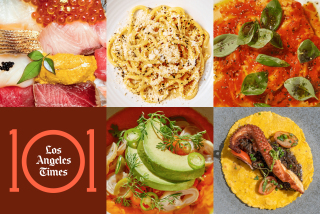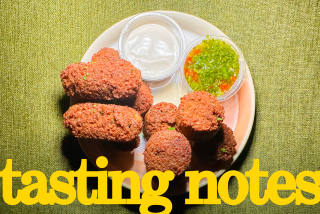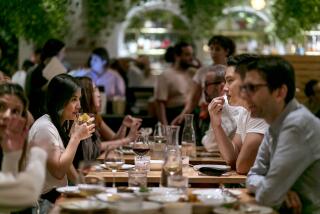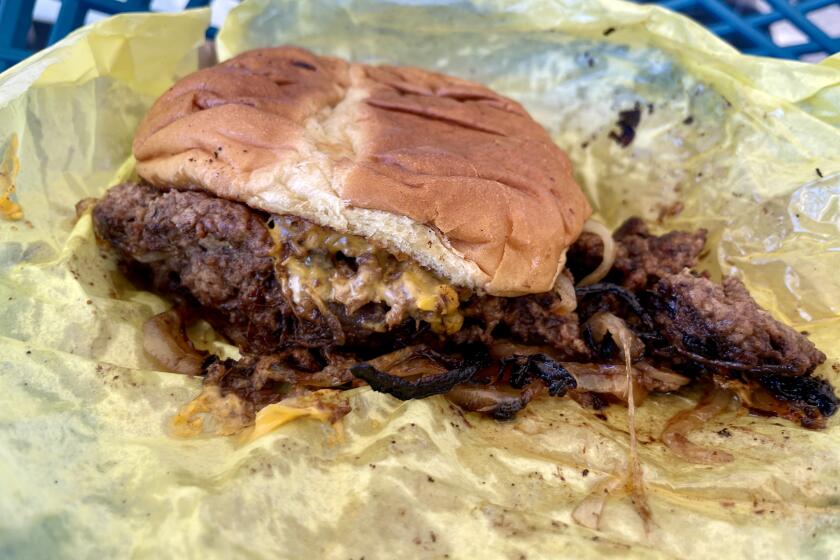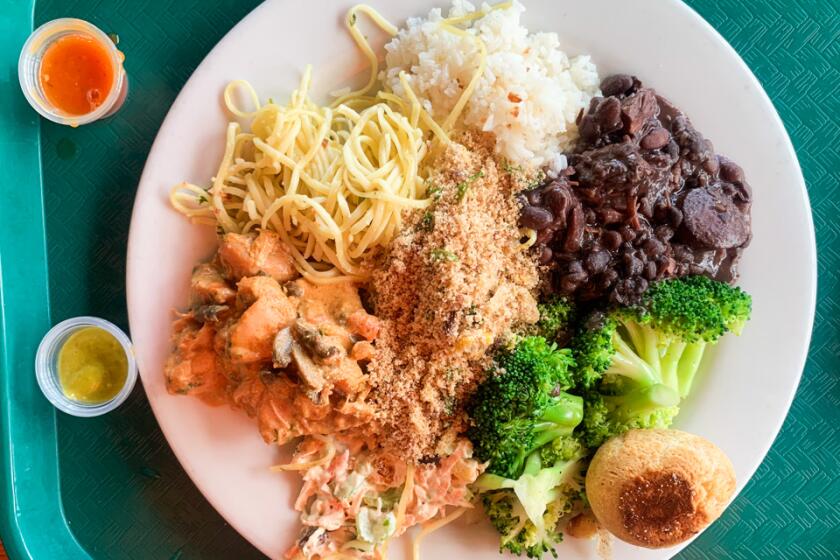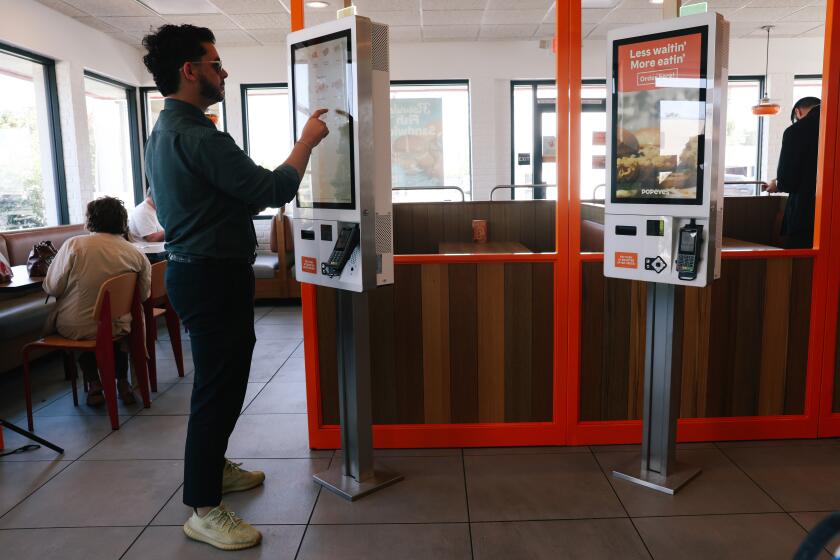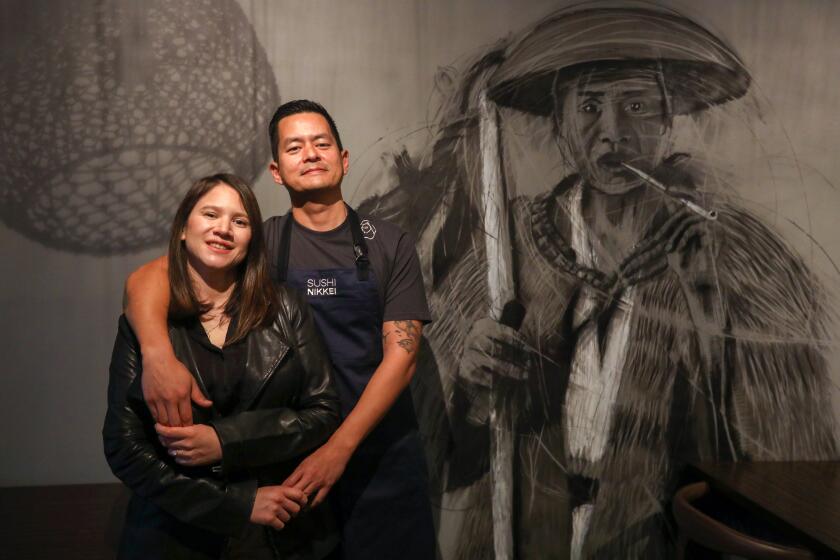Taste of Sunshine : Are You Ready for Boutique Prunes?
There are prunes and then there are prunes.
At least, that’s the way David Swall, who owns the Tulare mail-order dried fruit company Touched Select, sees it.
He’s one of a new wave of dried-fruit farmers who are making high-quality, hand-crafted products that sell at premium prices. Call them raisin boutiques, if you like, but don’t laugh. Take a look at some of this fruit and you can tell the difference--the colors are more brilliant, the textures softer and the flavors brighter and more nuanced.
One of these prunes is as much like the run-of-the-mill commercial production as soft buttery lambskin is like Leatherette.
Swall makes both regular black prunes and old-fashioned silver prunes (treated with sulfur during drying to preserve a more delicate, bronze-ish color) from Burton plums, which yield a prune that is three to four times larger than the standard and far sweeter.
First, the fruit has to be hand-cut to remove the pit. Then he dries it in an evaporator of his own design--cobbled together from discarded air conditioning units--that maintains a steady 120-degree to 130-degree temperature--far cooler than commercial evaporators.
*
“When the temperature gets to about 160 degrees, the sugar in prunes starts scorching,” he says. “Most commercial outfits go to 180. It takes a couple of hours longer to do it my way, but it helps the quality.”
For most fruits, Dinuba farmer Truman Kennedy doesn’t even use an evaporator. Except for late-harvest crops like apples and persimmons, all of the 14 tons of fruit he dries every year are sun-baked. “We’re one of the last of the family-owned, hand-cut, sun-dried yards in California,” he says.
And Kennedy is convinced that is one of the secrets of his success. “The cutting is where everybody meets and socializes and talks about their families,” he says. “It’s a very relaxing, very pleasing endeavor. One of the reasons I think our fruit tastes so good is that it is done by people who aren’t hostile. Your energy has a lot to do with your product.”
A long-time farmer, Kennedy got into drying as a way to use fruit that was picked too ripe to ship. “You always have a lot of that and it is usually thrown away,” he says. “You wouldn’t believe the amount of fruit that goes on the avenues here. Well, I had one old fellow, a senior citizen, come out and pick up my extra fruit to dry it. He showed me how to do it and I’ve just gone from there.”
Kennedy is a great believer in heirloom varieties and stumbled across a treasure house of them once while hunting in the hills about Sacramento. In an old mining town that had been abandoned and is being preserved by the Bureau of Land Management, he found fruit trees dating back to the turn of the century--many of them varieties that are difficult to find these days. He returned with a BLM land manager to take some cuttings.
*
“I grafted them onto my trees down here to start a sort of gene pool,” he says. “The flavor is just unreal. To me, it’s like saving a bit of the history of California. There was one apple tree up there that had to be over 100 years old. It was so old the inside had rotted away and they used it as a mailbox.”
Kennedy is a bit of a magpie when it comes to collecting fruit trees. He figures there must be 35 different varieties on his 14-acre farm. He has nine different prunes (including Stanley and President); flame, Thompson and Ruby seedless grapes, and Moorpark, Blenheim and Tilton apricots. Another of his specialties is dried white-fleshed stone fruit--old varieties such as Stanwick nectarines and Babcock peaches.
“Some of these varieties are just about gone,” he says. “They may not be as visually pretty, but on this stuff, flavor more important than the visual.”
Swall sells all of his roughly 3-ton production by mail order. It is not inexpensive. A 2-pound box of mixed dried fruit costs almost $30, including postage and handling. Touched Select can be reached at (800) 255-7039.
Kennedy’s fruit is also more expensive than the norm. He sells at several Southland farmers markets, hitting Santa Monica on Wednesday, Redondo Beach on Thursday, either Whittier or Venice on Friday, either Pomona or San Diego on Saturday and Hollywood on Sunday.
More to Read
Eat your way across L.A.
Get our weekly Tasting Notes newsletter for reviews, news and more.
You may occasionally receive promotional content from the Los Angeles Times.
